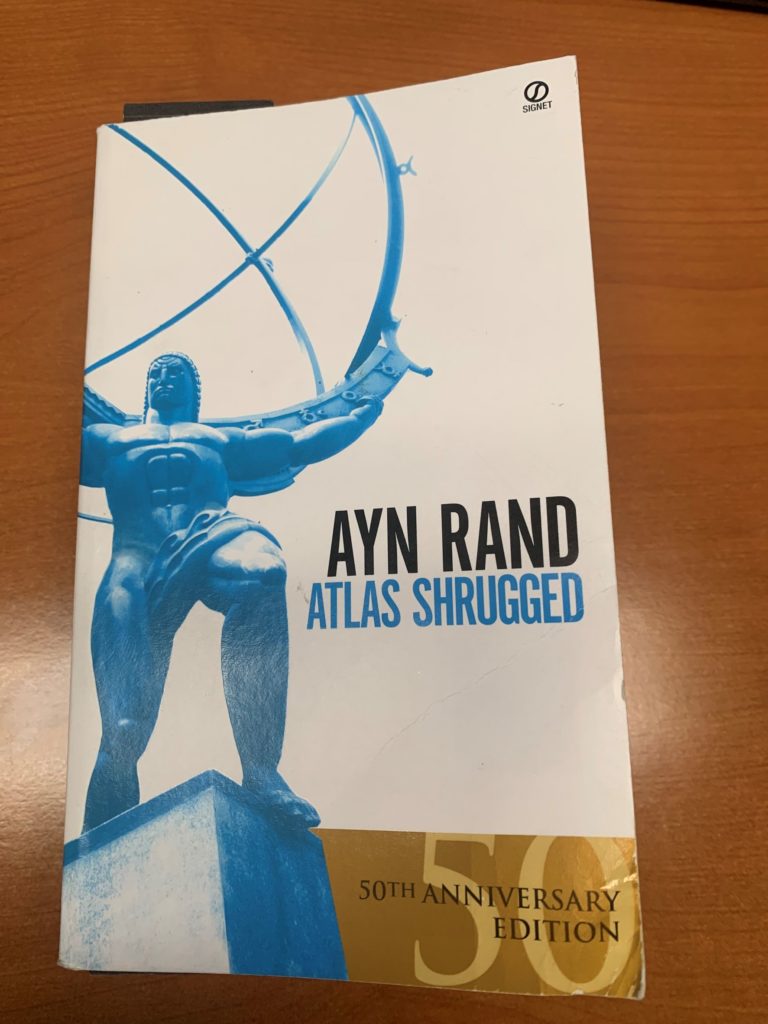This is the last chapter in part 2. Things seem to be no where near resolved at this point, so we will have to stay tuned for the last 400+ pages of the book.

Dabny meets a transient. He used to work at Twentieth Century Motor Company. He describes the process where the owner died and the factory was taken over by the workers. Part of the process was need based voting on wages and other issues.
“Remember that none of us may now leave this place, for each of us belongs to all others by moral law which we all accept”. One man, stood up and as he left the meeting and disappeared forever said “I will stop the motor of the world”. That man was John Galt.
After that conversation, the train stopped, the crew abandoned the train, possibly in Oklahoma or Kansas. Dabny walks with Owen Kellogg a former employee to find a telephone which is every five miles down the track. During the walk, she discovers that he is in possession of cigarettes with the dollar sign on them. He refuses to talk about the origin, but says that they can only be obtained by gold.
I suppose that these are the main two themes in the chapter. However neither is really new. This chapter is forty pages of marking time. Sure we learned the back story of John Galt and the Dollar symbol (in the book). It kind of reminds me of a podcast I heard years ago about the origin of the dollar. Apparently, the origin of the US dollar was based on the Spanish dollar when it was adopted as currency in 1792.
Kellogg draws some comparisons of the symbol, much like history or politics. There are facts and then there is how those facts are interpreted. For instance, there are those that use the dollar symbol as a weapon to mark greed and selfishness. While there are others that see it as a symbol of creativity and output.
I suspect that people that use the 1% moniker would not refuse a $100 bill if I handed them one, no strings attached. I have never heard of anyone refusing a raise solely on principal. For that matter, those same people do not work for free. So, it is not the money itself that is evil but more likely jealousy. And even more likely hypocrisy meaning who wouldn’t trade financial situations with someone in the 1% assuming that we could handle the transition?
Is everyone that rich a nice, hardworking and deserving person? I doubt it, in fact I would be willing to bet that a lot of them worked in some sort of gray area to get there. So let us look at my version of the Facebook story.
Back when MySpace was the top social media site, the internet was much more undeveloped. Because MySpace was adopted by the newest tech generation (pre-teens and teens), it drove slightly older people to Facebook. These also happened to be the population segment that had money unlike teens. Facebook used mining technology to gather information on it’s users to sell. It was a twist of fate that Facebook conquered MySpace.
As a result, Zuckerburg grew wealthy by a gray area activity. Was it legal, yes. Was it ethical, yes as long as the user agreement disclosed it. Was it proper? I dont know, I don’t use Facebook partially for this reason. Do I like Zuckerburg? No, but not for this. I don’t like the fact that Meta is in the business of manipulating speech.
Enough of that, let me remind people how you get rich. You do this by paying people less than what you make. For instance, I am not rich but I don’t pay the person that mows my grass the same wage that I make. This allows me to focus on the things that I want to do. If the price of the job ever came to my current wage level, I will quit my job right now and start mowing grass. I certainly respect and appreciate the job. They can do in one hour what takes me all day to do. But, my time is worth more to me than the cost of mowing the grass.
Whether it is the Waltons, Musk, Buffet, Gates, etc they all payed people around them less than they made so that they could use their talents in other areas. And let us not forget that there are a lot dull people employed at XMart making $18/hour that would struggle to find a replacement job that is as good. Before we get too judgmental about who did what to get where, it would be good to refresh ourselves with the the tenth commandment: ‘thou shalt not covet’.
End Your Programming Routine: I will say that I struggled today. I kept writing until something quasi-impactful emerged. It all starts with the book and this thing is starting to get a little long in the tooth. I certainly don’t regret doing this and it has definitely been worth it so far. It’s just that some of these chapters don’t add any value to the overall work. I will save the rest for when I finish.
Recent Comments